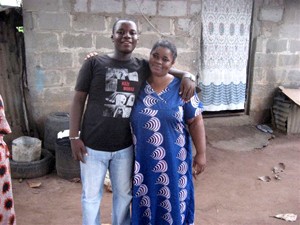
Thirty-two-year-old Joy Emmanuel lived with fistula for half of her life. Long after giving up hope of a remedy, she heard on the radio that women could receive fistula surgery at the Faridat Yakubu Fistula Center, in Gusau, Nigeria.
Obstetric fistula is the result of prolonged labor without prompt medical intervention, causing a hole in a woman’s birth canal which leaves her with chronic incontinence and in many cases, the loss of the baby. Emmanuel’s baby survived, but she was left with the serious medical condition. Women with Fistula are stigmatized among their peers and by society in general.
The Nigerian National Strategic Framework for fistula prevention and control estimates that between 400,000 and 800,000 women are affected. Nearly half of worldwide fistula cases occur in Nigeria, with between 50,000 to 100,000 new cases each year. USAID is working to address the challenge of obstetric fistula in five states in northwestern Nigeria. During the project’s first three years 2,822 women received fistula repair surgery.
After her successful operation, Emmanuel was determined to give back to the program that helped her. She recently told her story on Nigeria’s USAID-supported “Health Watch” radio show.
Joy Emmanuel’s Story:
“When I was pregnant at age 16, not once did I go to the doctor for prenatal care. I had my baby at home with the help of two women in my village that helped me deliver on the floor. I labored for two days. This was how I got fistula. At first I did not do anything because I did not know what was wrong. I did not go to the hospital and was afraid of the offensive odor. My husband left me. My mother was at my side, but I would stay away from other people. I was unhappy. I thought there was no way out.
“Then one day I was listening to the radio, and there was an ad about fistula treatment. I left home with only a small bundle of clothes. I was alone, and I didn’t have food. But the hospital in Zamfara state took care of me. They had two big wards and the place was filled with women of all ages and all of us had been rejected by our people.
“At the hospital they put a smile on your face. Since the day I got there, I had no regrets: they were so caring. After the surgery, they have a rehabilitation center, where they train you in tailoring and knitting. They make sure you are happy and can do something in life; you will not be idle again.
“Before I was embarrassed, but now I am as free as a bird in the air. I thank the USAID fistula care project for sponsoring the radio program and for making my treatment free. May God continue to bless them. I have a new life.”







Comment
Make a general inquiry or suggest an improvement.